Texas Gov. Rick Perry started his campaign with a prayer rally in Houston last August designed to give him a boost with religious evangelicals even before his official announcement. Backers claimed 30,000 of the faithful attended the gathering, known as The Response, though the numbers probably were inflated.
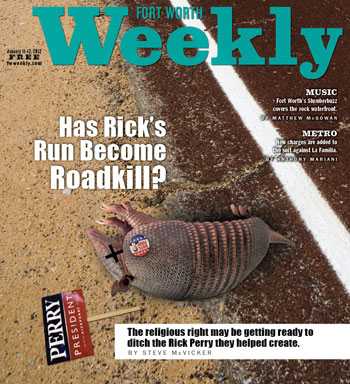 The numbers — dollar signs in this case — were anything but exaggerated a few days later when Perry attended another gathering, this one much smaller and very private. A group of influential and deep-pocketed members of the evangelical political world met with the governor at the Hill Country home of Dr. James Leininger to seal the deal on a Perry for President campaign. As Politico.com put it last August, the Leininger-hosted meeting was “a call to action to discuss the 2012 election and the future of the country.”
The numbers — dollar signs in this case — were anything but exaggerated a few days later when Perry attended another gathering, this one much smaller and very private. A group of influential and deep-pocketed members of the evangelical political world met with the governor at the Hill Country home of Dr. James Leininger to seal the deal on a Perry for President campaign. As Politico.com put it last August, the Leininger-hosted meeting was “a call to action to discuss the 2012 election and the future of the country.”
Five months later, it looks like many of those same folks will be gathering this week to hold solemn services over that campaign, which no longer looks like it has a prayer. This weekend, according to the contents of an e-mail invitation published by Politico, heavy hitters from the religious right will meet near Brenham at the ranch of former Texas Court of Appeals Justice Paul Pressler III. Among the invitees are James Dobson, head of Focus on the Family; Don Wildmon of the American Family Association that sponsored the Houston prayer rally; Richard Land of the Southern Baptist Convention; Christian Zionist leader John Hagee of San Antonio, who appeared at the prayer rally; and attorney Kelly Shackelford of the Plano-based Liberty Institute.
These folks aren’t just Perry’s cheerleaders and strategists — they represent groups and individuals behind much of the $17 million-plus that Perry banked for his bizarre campaign. Word is that this weekend, the fundamentalists will be looking for a new Christian candidate to back. Big hint: This part of the religious right doesn’t consider Mormons to be Christians.
The question isn’t so much what happened to Perry between Houston’s Reliant Stadium in August and his fifth-place finish in the Iowa caucuses on Jan. 3, where he drew only a measly 10 percent of the vote. Most of that has been played out in painfully public ways. It’s how and why he’s reached this point that are more interesting. And that involves a combination of pratfalls, poor preparation, bad advice, a rather compliant Austin press corps, a dimming of the Perry star among the evangelical rank and file, and a governor who — despite his long record in public office in Texas and deep financial backing from wealthy and powerful folks, — just doesn’t seem to be bright enough to shine on the national stage.
Even without the flubs, Perry was never able to articulate what separated him from the rest of the GOP pack. He offered a flat tax option to Americans fed up with the Internal Revenue Service, but so did Herman Cain and former Speaker of the House Newt Gingrich. He tacked as far right as he could, only to be hammered by other right-wing candidates such as U.S. Rep. Michele Bachmann and former U.S. Sen. Rick Santorum over the Texas governor’s rather out-of-character notion that the children of undocumented workers should receive in-state tuition breaks at Texas colleges. In the end, his was a campaign of calculated platitudes rather than real solutions to hard problems. And even his faithful finally noticed.
********
Among the financial leaders who will be considering the wreckage this weekend in Central Texas, James Leininger, probably best known politically for promoting private school vouchers, may wield the most dollars. According to an August 2011 report by the liberal-leaning Texans for Public Justice, Leininger:
•gave $239,233 to Perry’s gubernatorial campaigns and another $100,000 to the Perry-affiliated Republican Governors Association in 2007;
• benefited from a Perry economic development slush fund to the tune of $4.75 million in Texas taxpayer money;
• supplied $100,000 of the $121,712 raised to push for a 1995 state constitutional amendment to outlaw gay marriage, which was defeated at the polls;
• gave $196,000 to help Karl Rove elect a conservative, anti-tort majority to the Texas Supreme Court in 1988.
Pressler’s campaign contributions pale by comparison, but he’s no piker. According to statistics compiled by the Texas Tribune, he contributed $30,000 to Texas Republicans during the past two years.
Until last summer, Pressler sat on the board of directors of Salem Communications Corporation, which specializes in Christian radio stations and, according to Forbes magazine, is the fifth-largest communications company in the United States. Before that, Pressler served on the Texas Court of Appeals from 1978 to 1992. He is also a former state district court judge and state legislator and worked as an attorney for the giant Houston law firm of Vinson & Elkins.
More germane to the upcoming meeting he is hosting, Pressler is also a former first vice president of the Southern Baptist Convention. If blog remarks left on the www.baptistboard.com web site are any indication, Pressler is a lightning rod for emotions in Baptist circles.
“He is the most destructive individual in the life of the SBC,” reads one entry. “He is responsible for more slander, libel, and outright lies about some of the greatest Christians Southern Baptists have ever produced. He is a good man, but a misguided man, who thinks his way is the only way, and that his understanding of what the Bible is, is the only acceptable understanding.”
Pressler comes by the controversy honestly. In the late 1970s, along with the Rev. Paige Patterson of Dallas, Pressler was a driving wheel in the plan to expose liberal theology teachings and worship at radical SBC institutions such as Baylor University in Waco. Right — Baylor, that bastion of left-wing radical sin. Pressler later wrote about that intra-faith struggle in his book, A Hill on Which to Die, described by one reviewer as the story of how fundamentalists brought Southern Baptists “back to the Word and Will of God.” Others say that saga covers a time of religious McCarthyism during which many good God-fearing people lost their jobs.
********
Perry officially declared his candidacy at a rally in South Carolina on Aug. 13. He was riding a crest of popularity built largely on his male-model good looks and his decade as governor of Texas — the longest anyone has served — as well as the somewhat misleading boast that during the current recession, more jobs had been created in Texas than anywhere else in the country.
Even the revelation that most of those new Texas jobs were minimum-wage service-industry gigs didn’t slow the initial Perry juggernaut. He rocketed past the front-runner, former Mass. Gov. Mitt Romney, and staked a claim to a 35 percent approval rating in GOP polls.
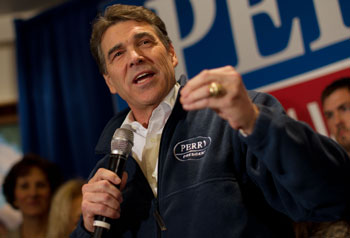 But almost as quickly as Perry had jumped out in front, his campaign began to unravel — at first not even by his own doing. In October, shortly after introducing Perry at the Values Voters Summit in Washington, D.C., Dr. Robert Jeffress told NBC News, “Mitt Romney’s a good moral person, but he’s not a Christian. Mormonism is not Christianity.” Jeffress, senior pastor for the 10,000-member First Baptist Church of Dallas, said Mormonism “has always been considered a cult by the mainstream of Christianity.”
But almost as quickly as Perry had jumped out in front, his campaign began to unravel — at first not even by his own doing. In October, shortly after introducing Perry at the Values Voters Summit in Washington, D.C., Dr. Robert Jeffress told NBC News, “Mitt Romney’s a good moral person, but he’s not a Christian. Mormonism is not Christianity.” Jeffress, senior pastor for the 10,000-member First Baptist Church of Dallas, said Mormonism “has always been considered a cult by the mainstream of Christianity.”
The Perry camp immediately attempted to distance the candidate from Jeffress’ remarks, but it left a smell that didn’t quickly fade.
Of course, Perry’s list of subsequent campaign pratfalls is now infamous. Who can forget his train wreck of “oops” moments?
• During one of the many televised GOP debates, a flustered Perry was unable to name the third of the three federal departments he intended to abolish.
• At an early campaign stop in Iowa, Perry described Federal Reserve chairman Ben Bernanke as a traitor and suggested he would not be treated well if he visited Texas. The remark generated cries even from other conservatives that Perry had stepped over the line of decency.
• Before a group of potential supporters in New Hampshire, a seemingly addled Perry delivered a painfully long-winded ramble that concluded with him displaying what appeared to be a strange affection for a miniature bottle of maple syrup. After being presented with the bottle as a parting gift by the master of ceremonies, Perry caressed it and held it close to his head and heart. He later explain that his odd performance was due to the residual effects of recent back surgery.
Perhaps even more damaging was his declaration during one of the debates that he supported in-state tuition rates for the children of illegal aliens working in Texas. The ramifications of that position rattled the party to its conservative core and has been cited by many conservative voters as a reason they have backed off from supporting the Texas governor.
Even during Saturday night’s debate in Massachusetts, Perry’s self-inflicted carnage continued. He left many observers scratching their heads when he declared that he would not hesitate to send U.S. troops back into Iraq.
Most of those blunders and others like them could charitably be written off as mistakes made by a man caught in the headlights of the national media. However, in December, Perry — with apparent malice aforethought this time — unleashed perhaps the most mean-spirited chapter of his entire sad campaign: a video starring the governor in his finest Marlboro Man outfit, whining about the abomination of having gays in the military and of children not being able to celebrate Christmas in public schools, which was flat-out wrong. Rather than providing traction for Perry, the ad was viewed by many as a not very funny joke. It became fodder for endless send-ups on the internet and marked a new low for his campaign.
All the while, Perry’s brain trust appeared clueless as to how to pull their candidate out of his free-fall. His inner circle of campaign advisors includes his wife Anita, who reportedly pushed Perry into the race by claiming that that it was God’s will, plus longtime staffers and appointees such as Dave Carney, Dierdre Delisi, and Ray Sullivan. Having been in his camp for so long, perhaps they were as blinded to his campaign-trail shortcomings as the governor himself.
For the most part, Team Perry has either downplayed the candidate’s mistakes or else chalked them up to fatigue remaining from that back surgery in the summer.
But the gaffes were evidence, said some critics, that Perry just didn’t have what it takes to put in the long hours of prep work needed to nail down the issues, players, and positions. In a strange move, the campaign team trotted Perry out on The Late Show with David Letterman — an odd choice given that Letterman has never hidden his disdain for Perry — to do a Top Ten List send-up of his campaign blunders.
None of it worked.
After the votes had been tallied on caucus night in Iowa, Perry appeared despondent and announced that he was going home to Texas to reassess. Most observers took that to mean he was calling it quits. However, the next morning, still in Iowa, the spandex-clad governor surprised even his staff by pausing, mid-jog, to give photographers the thumbs-up sign and tweeting that he was on his way to the South Carolina primary.
********
Dr. Richard Murray, a University of Houston pollster, said the fact that Perry even entered the presidential race shows what kid-gloves treatment he had gotten from the Texas press corps in the last decade. Murray cites as a case in point the story about the rock that for years apparently sat near the entrance to the Perry hunting lease with the word “Niggerhead” painted on it.
“Why did it take the Washington Post to uncover that story?” Murray asked, then answered his own question: “Perry had a cozy, insider relationship with reporters in Austin.
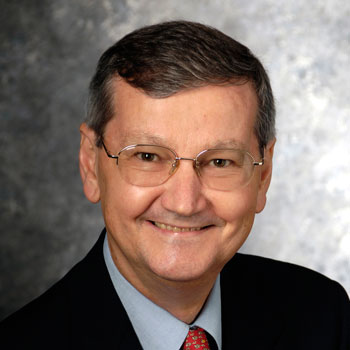 “The Austin media had a vested interest in Perry doing well and becoming a player on the national scene,” Murray said. “They let him off the hook, especially when it came to holding him accountable for not debating his opponents or interviewing with newspaper editorial boards. It was basically like he was saying, ‘I’ve got this thing won, don’t bother me.’ ”
“The Austin media had a vested interest in Perry doing well and becoming a player on the national scene,” Murray said. “They let him off the hook, especially when it came to holding him accountable for not debating his opponents or interviewing with newspaper editorial boards. It was basically like he was saying, ‘I’ve got this thing won, don’t bother me.’ ”
And they didn’t. The state media by and large did not press Perry for sidestepping debates and editorial board meetings. And it wasn’t until after he declared his candidacy for the GOP presidential nomination that other damaging revelations either came to light or finally received the level of attention they deserved.
For example:
• Following the 2006 Texas governor’s race, the Perry campaign paid an out-of-court settlement of $427,000 to his Democratic Party opponent, former U.S. Rep. Chris Bell of Houston, in connection with an illegal $1 million contribution to Perry from the Republican Governors Association. The RGA, at the time chaired by Mitt Romney, has also been ordered by a federal judge to pay Bell $2 million. That judgment is on appeal.
• While Perry complained about the response of President Obama and the federal government to wildfires raging in Texas last summer, it was only months later that stories noted that the governor and Texas lawmakers had cut state firefighting resources by 75 percent — from $30 million to $7 million — earlier in the year.
• The release, due to campaign filings, of a so-called blind trust that supposedly kept Perry at arm’s length from his financial holdings may have raised more questions about Perry’s ethics than it answered. Of particular interest was his part ownership in MKS Natural Gas Company and its properties near Weatherford, in the Barnett Shale gas drilling region.
MKS was founded by the late Ric Williamson, a former state representative from Weatherford who became a mentor and close friend when Perry was elected to the legislature in the late 1980s. As governor, Perry appointed Williamson to the Texas Transportation Commission, where Williamson backed Perry’s ultimately failed plan to build a 4,000-mile toll road system called the Trans-Texas Corridor. The corridor would have run through property owned by MKS. During his 2010 race against Perry for the governorship, Democrat Bill White, former mayor of Houston, repeatedly charged that one of Perry’s most profitable assets was his interest in MKS, which owns about $3.4 million in mineral rights. White’s claims failed to interest most members of the Texas press corps.
Perry is widely criticized these days for practicing “crony capitalism,” but it took a long time for the news media coverage to reach critical mass on his use of tax dollars and public programs to benefit his supporters.
The governor, for instance, has had a cozy (though not familial) relationship with Bob Perry of Perry Homes, for whom the governor has carried a considerable amount of water. In 2003 Perry backed the creation of the Texas Residential Construction Commission, which had the mission of protecting homeowners from bad builders. Instead, it became a safe haven for builders facing complaints from consumers who claimed they could not get fair hearings about their grievances. The legislation creating the commission was written with the help of John Krugh, a Perry Homes lobbyist. The year the commission was created, Bob Perry contributed $100,000 to the gubernatorial campaign. Later that year, the governor named Krugh to the commission, which was eventually abolished by the legislature.
Then there’s Perry’s support of campaign contributor Harold Simmons, the Dallas billionaire who has gotten the green light to turn part of West Texas into a nuclear waste dump.
Despite those stories and others, Texas Monthly actually attempted to run interference for Perry with the national media just before he announced his presidential aspirations. In an Aug. 8, 2011, piece entitled “Dear Yankee,” longtime Monthly political writer Paul Burka put forth a list of the do’s and don’t’s for out-of-state reporters covering Perry, with a plea that they “get it right this time.”
Perry should not be dismissed as a “soft or feckless pretty boy,” scolded Burka. He went on to say that “one way or another, Perry is going to give [the media] excitement.”
But he didn’t. So last week, the Monthly crowned Perry as its 2012 Bum Steer.
********
Many observers say Perry’s apparent lack of readiness and knowledge left his campaign mantra of “Let’s get Washington out of your life” ringing hollow. It was a motto, not a plan.
“When you get to the national level, there are serious problems that people expect to be addressed and resolved,” said Professor Calvin Jillson, an SMU political scientist. But Perry “was just not used to talking about using government to solve problems.” Even though conservative Republicans like to talk about limiting the role of the federal government, Jillson said, “that convinced a lot of people that this was not a job he was qualified for.”
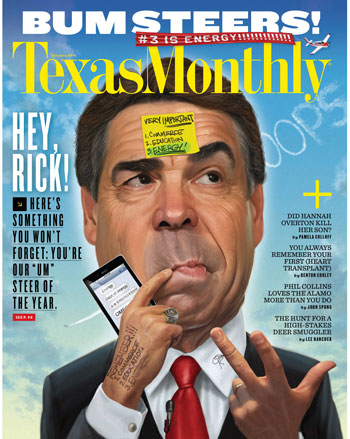 The professor acknowledged that Perry also could not overcome consistently poor performances in debate after debate.
The professor acknowledged that Perry also could not overcome consistently poor performances in debate after debate.
“Once you get him outside of Texas, he’s like a fish flopping on the dock,” Jillson said. “He’s just out of his element. I think it was in the first debate, when he was asked a question about loose nukes in Pakistan and what he would do about them — you might as well have been trying to do philosophy with a pig. I mean, what’s the point?”
What’s the point indeed when you have a candidate who can’t remember his talking points, doesn’t remember that the voting age is 18, forgets the name of U.S. Supreme Court Justice Sonia Sotomayor (whom he cites in a criticism of what he refers to as “activist judges”), and refers to Kim Jong-il, the late leader of North Korea, as Kim Jong the Second.
“George W. Bush was a gut [knee-jerk] politician, but he was fairly disciplined and spent a hell of a lot of time preparing himself to run for president — unlike [Perry],” Murray said. “And look at this big decision he made [to stay in the race]: ‘I’m out jogging and I think I’m going to do this.’ I mean, how in the hell is he going to raise any money? They’ll burn through whatever they have left. But they dropped a ton in Iowa, and this will just further embarrass him.
“The smart decision now is to drop out of the goddamned race,” Murray said.
********
But who knows? Despite watching their guy sink like a rock in the polls during the past five months, maybe Perry’s supporters will double down this weekend. Presumably he still has part of that once-formidable campaign war chest. He already has a well-organized campaign staff in place in South Carolina. Nor has former Pennsylvania Sen. Rick Santorum, the current darling of the religious right, secured a lock on support in South Carolina that might otherwise go to Perry.
No matter how much they agree with Perry’s views, the religious right’s big guns have to be pragmatic. If they want an evangelical revolution in American government, at some point they have to get behind somebody who can actually win. And no matter how often Perry invokes the name of comeback artist Tim Tebow, the Denver Broncos quarterback who prays on the field, the governor doesn’t seem to have any fourth-quarter mojo in him.
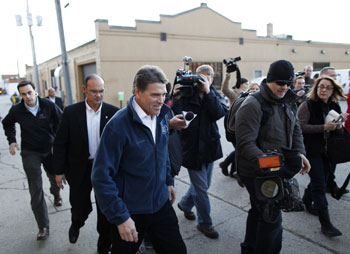 Frankly it’s hard to know what to make of Perry’s decision to continue after Iowa, Jillson said. “He’s in low single digits in New Hampshire, and in South Carolina he’s in the mid single digits, but still in the single digits,” he said. And Perry had been counting on the support of South Carolina Gov. Nikki Haley. Instead, she recently endorsed Romney.
Frankly it’s hard to know what to make of Perry’s decision to continue after Iowa, Jillson said. “He’s in low single digits in New Hampshire, and in South Carolina he’s in the mid single digits, but still in the single digits,” he said. And Perry had been counting on the support of South Carolina Gov. Nikki Haley. Instead, she recently endorsed Romney.
“So I think his prospects are very bleak,” the SMU political scientist said. “I think he’s going to have a very uncomfortable time. Every question he answers will be negatively phrased. ‘What are you doing here? … Are you going to be able to do any better?’ So it’s going to be very hard for him to craft a positive message and get that reflected in the media.”
Murray also thinks Perry’s potential for re-election in Texas is slim. And if Perry does seek another term as governor in 2014, Murray believes he will have not only a Democratic opponent but challengers in the Republican primary as well.
Plenty of ambitious Republicans have been thwarted because “moving up has been difficult, especially with Perry staying [as governor] since 2001,” the pollster said. “That would give the Democrats their best chance at winning the job since 1990.”
Come 2014, Jillson thinks Rick Perry will be looking for a soft place to fall.
“I think what he’ll do is just finish out his term and then look for some not-very-taxing private-sector place to make some money,” he said.
It shouldn’t be hard for him to find that cushy landing place. “There are lots of people whom Perry has served well as governor,” Jillson said, “in the lobby and the moneyed interests of the state.”
Author and journalist Steve McVicker lives in Houston.











